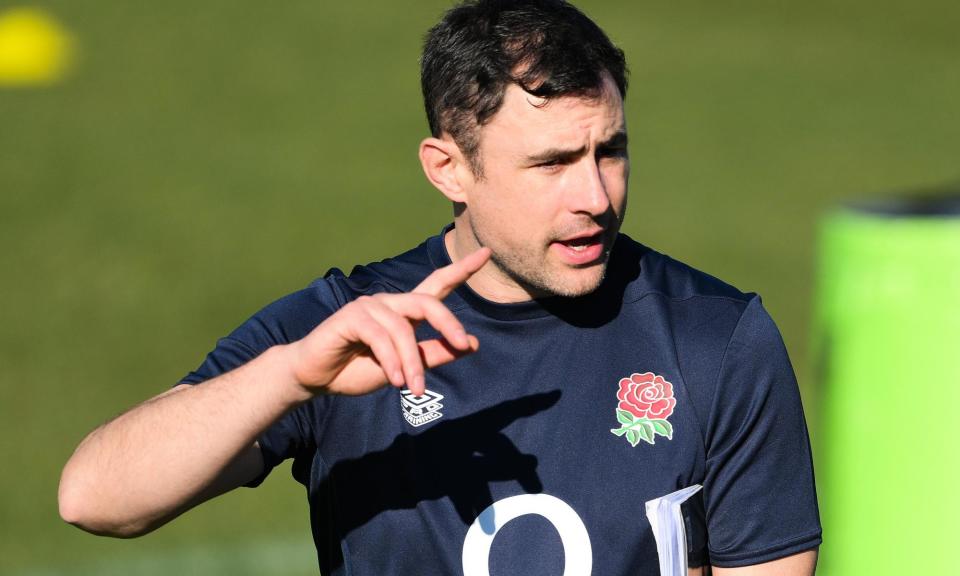Felix Jones arrives to inject intensity into England’s Six Nations tilt

If you can’t beat ‘em, hire ‘em. When England’s players last saw Felix Jones he was assistant coach to the South African team who edged past them in last year’s Rugby World Cup semi-final in Paris. Now here he is in their inner sanctum. An Irishman with a red rose on his chest, looking to share some Springbok trade secrets ahead of this year’s Six Nations championship.
The question is: which ones? The “traffic light” communication system from the Boks’ coaching box? The 7-1 forward bench split? Big-name water-carriers? For now, suggests Jones, the answer is none of the above. “I don’t think you will be seeing it at Twickenham,” he murmured this week, when asked if Rassie Erasmus’s familiar traffic lights would be reappearing. What about a replica “Nuke Squad” of beefy replacements? “I think that’s probably a bit further down the line, too.”
Related: The Breakdown | Winds of change blow through Six Nations to spark new sense of purpose
So what exactly will the 36-year-old Jones, who is still based in Dublin, bring to his new role as England’s defence coach? To judge from the lengthy list of scribbled notes written in blue ballpoint pen on the back of his left hand, the answer is detail and lots of it. Steve Borthwick, England’s head coach, describes him as “one of the most intense people I’ve ever met, which is saying something”. On Jones’s first tactical address to the squad, Borthwick recounted Jones “showing things I don’t think I’ve ever heard any other coach discuss” and the pin-drop silence in the room as everyone began to appreciate the extra value he could add.
Having already shared in two World Cup victories and a series victory over the British & Irish Lions, Jones’s coaching CV is already something to behold. Particularly as he had no intention of becoming a coach when, having represented Munster and won 13 caps in the back three for Ireland, injury forced him to retire at 28. “I never thought of it as a career path. I just kind of fell into it. Anthony Foley asked me to come back in and throw my eyes over what Munster were doing and give a bit of feedback. The following season Rassie Erasmus came in and said: ‘Look, do you want to do this bit more seriously?’”
Born into a family with generations of prominent Irish architects, Jones clearly has an analytical mind suited to the modern data-heavy game. He also has a contemporary grasp of the game, having shared a pitch with several of England’s current squad. Elliot Daly and Henry Slade started opposite him when the Irish Wolfhounds and England Saxons met in Cork in 2015. Luke Cowan-Dickie and Maro Itoje were on the bench. “Dan Cole also mentioned playing against me in a Churchill Cup game … and possibly Danny Care in the U20s somewhere as well. I think we’re all just showing our age.”
It gives him a keen grasp of exactly what it takes to win at the highest level these days – and what might be worth stealing from the world champions. “It is not always transferable but for anyone who has played rugby, you get a feeling when a side is very tight, just won’t give up and will stay in the fight. And whether you’re at schoolboy or international level there’s a premium on collision winning. That almost goes without saying.”
He is also a renowned student of the breakdown where it helps to have the array of formidable forward artillery that South Africa possess and England are still hoping to assemble. Jones, though, makes clear muscle is not the only answer. “Size and power obviously plays into things but there’s also the character, toughness and motivation of people. If we can keep finding the right guys in the Premiership who can display those traits I think that can be as effective, if not more so, in terms of collision-winning.”
Jones also has Jedi levels of expertise in how modern Test level defences now operate. “What most defences are chasing is an increase in putting opposition skill sets under pressure. Attack is getting so good these days so that will be one of the big things.” On the evidence of last October’s wet weather semi-final at the Stade de France, he believes England already have fundamental pillars in place. “The perception we had was that the English side were an incredibly effective and difficult team to beat. I thought it was an incredible match. I know the rain was lashing down but in terms of an arm wrestle and the tightness of the game, I thought it was hugely exciting.”
Which begs the question of how much he will broaden England’s horizons or, in keeping with South Africa’s successful modus operandi, narrow them? Keeping spectators entertained is not always a coaching priority, even if Twickenham patrons are crying out for something more uplifting. “There’s also the side of winning Test matches and not blinding yourself to what is effective,” cautions Jones. “You’ve got to find the marriage of it and it’s challenging.”
How he fares in Kevin Sinfield’s former role will be integral to the team’s development either way. These are early days but Jones is not someone who shrinks in the face of adversity. The highlight of his playing career, he reckons, was managing to battle back from two serious knee operations and a dislocated neck. When he invites England’s players to gather round and hear his thoughts on how exactly to approach major games, his track record suggests they would do well to listen.

